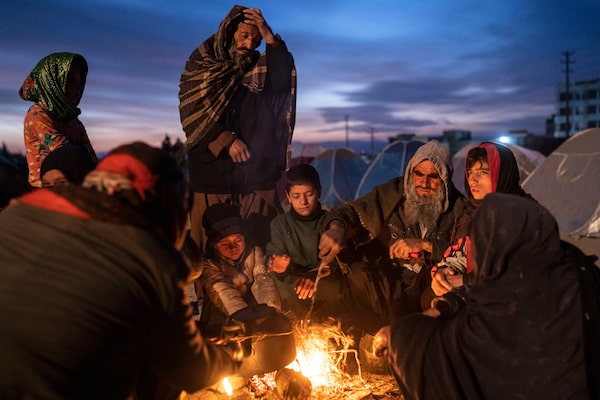
A family warms up by a fire outside the Directorate of Disaster office in Herat, Afghanistan, on Nov. 29. About 2,000 displaced people were in Herat after leaving their village in Ghor province due to drought.Petros Giannakouris/The Associated Press
Jamaluddin Aram is a documentary filmmaker, producer and short story writer from Kabul. He lives in Toronto.
Padshah Gardeshi: A Dari phrase for when a king is dethroned. It has also come to mean a government toppling and being replaced by a new one. This happened on Aug. 15. The Taliban ousted Afghan president Ashraf Ghani, who fled to the United Arab Emirates.
My grandfather died never having known when he’d been born. I think he didn’t care about the beginning of something he could already see the end of, especially from where he lay in the hospital bed with the scars in his liver, and the clear tube carrying the greenish fluid from his swollen belly down into a large pail on the floor. I can still taste the salt and metal in the vapour from the pail in the cold room, and remember the snow falling outside and the calm on my grandfather’s ashen face. He knew then what I know now: that the key to life is to have no expectations, to know what to remember and what to forget, and to have patience. A good amount of the latter if your motherland is called Afghanistan. You would need it.
Like my grandfather, I don’t know my birth date and I don’t care either. I was born on some grey winter day around the time the last Red Army soldier crossed the Friendship Bridge.
“It was cold and rainy,” my mother says, looking out the window, her eyes bright with remembering. “At the time of the Saur Revolution, your sister was four years old,” she continues. When that cholera plague swept through town, it took Aunt Diljan with it, but she returned from the edge of death with no recollection of the horror she had suffered.
This, my mother doesn’t have to say because I remember, and I remember that three years later, one dry September evening in 1996, the Taliban captured Kabul; it was our neighbour’s son’s wedding and the Volga sedan that Kaka Aziz, the groom’s father, had borrowed to bring the bride home was confiscated. By then, grandfather – who lived through the Saqqawist coup of 1929 – had been dead five years. Disease, hunger, war, rebellion, riot, earthquake, evacuation, invasion, Taliban, massacre … on goes the list of events we as a nation hang our memories from. Amid all this, we still like to believe that Alexander the Great said, “God must have loved Afghans because he made them so beautiful.”
I don’t believe that claim for an instant. I find it hard to trust a man’s dictum of beauty while he gave himself to a life of greed, of razing cities, selling men and women into slavery, and killing anyone who desired to live free. We are beautiful and God hates our guts. That I trust.
For us, history is not linear, it is the shape of guinea fowl eggs. We walk on history’s hard shell knowing we’ll end up where we started. I have reason to trust this as well. Our governments collapse with regularity and at a rate faster than the earth beneath us can generate seismic waves. And we ride on the tail of this raging beast named the Ring of Fire, an active earthquake belt that circles the Pacific Ocean, starting in Chile, running along the Andes to the Aleutians to Japan and the Philippine Islands, branching off into the Himalayas and passing through the Hindu Kush.
Our mountains are young and eager and lust for growth, and our wounds are old and forget to heal. Yet we don’t speak about the shuddering we feel under our feet, and never about our suffering. We know pain is a language not many people know. We keep things to ourselves and believe in God, but God doesn’t believe in us. We wake up in the middle of the night to pray; we fast, sacrifice animals, name our children after deities, light candles in shrines, and make halva on Friday evenings and offer it to the hungry. None elicit His pity. Better go in person, we decide, and travel for days to get to Mecca, but God is never home. So we turn to prophets, Imams, saints and sanguinary conquerors for help. Anything they can do to soften His heart of stone. Then come the long spells of drought, clouds of locusts, devastating quakes, and men with unsheathed swords and cocked guns who always happen to have some special message from Him.
The next thing we wish to be sent is an asteroid.
Mountain-watching in Taliban-held Kabul: At top, two teenagers look out from their house in a neighbourhood known as 'TV Mountain' for its broadcast antennas; at bottom, Afghan men take in the scenery from the top of a hill.Zohra Bensemra/Reuters
A man who lives near Kabul International Airport says that a dead body fell from the sky over his neighbourhood. There’s no terror in his eyes that could possibly be traced back to this event. He goes about it as though airborne corpses are banal occurrences. He’s nervous, however, and that’s because it’s his first time being in front of the camera. His eyes don’t know where to look. He stands erect; his voice shakes as he speaks. It seems he is more concerned about his dry mouth than the words his tongue forms to recall the grotesque scene. Somehow he finishes the interview and manages to have a message to the nation: This land is our mother. She needs us. Stay. Don’t flee.
Three things occur to me as the news ends and the man’s words continue to echo in my head.
One, I should go pour myself a glass of something and drink knowingly, as though it were an active act of mutiny against thirst. Two, I wish the disgraced president had heard this man prior to boarding that plane to a safe place of clean beaches, good food, and hotel rooms with mattresses that allow 10 per cent more deep sleep.
The third thought is morbid. It concerns the young men who clung on to the sides of a taxiing cargo plane on the first day the government fell and so began the largest civilian evacuation in history. What were the last thoughts that passed through their minds? I ask myself.
My imagination has never been good at handling height, or speed. It lags and drifts and is prone to seeking poetry in things. There’s poetry in death. But life isn’t fair, and not everyone gets to die a poetic death. So I imagine the young men’s life before the concept of flight enchanted them. I take their possible memories in my hands like a hunk of potter’s clay and mold them to fit my rumination: the excitement of flying a kite, the thrill of learning to ride a bike, the frenzy and elation of youthful love, a dislike for okra, a liking for rain.
These memories are too neat and don’t hit hard enough. I want something strong and turn to religion. I wonder if they, the young men, had given the story of Adam and Eve much thought. We studied it in the Quran in the mosque in the winter when schools were off. The tempting fruit? The hand itching with desire? Then Adam and Eve landing on Earth? The young men should have remembered that God is an impish child who teases and tests and likes practical jokes; that that cargo plane was our forbidden fruit; and that our fall from heaven would never be as smooth. For proof, listen to the gruesome details the nervous man gave in his interview with Tolo TV before delivering that message about flight.
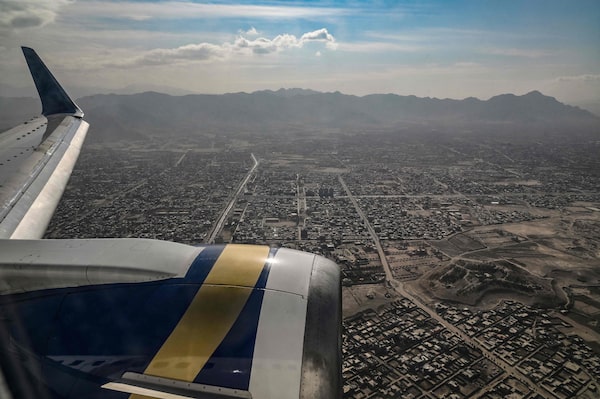
A commercial plane flies over Kabul on Nov. 24.HECTOR RETAMAL/AFP via Getty Images
Afghanistan is a country with four seasons and every season is migration season. Over the years, most people that I know have left or dreamed of life elsewhere.
One friend is a voice artist. He is the product of the media boom of the early 2000s, when a rare light shone after the dark period of Taliban rule, and radio and television stations sprouted up across the country like wildflowers. The network he worked for hired Iranian instructors to train dubbers who could sell foreign soap operas to a local audience that was tired of reality and sought comfort in fictional premises.
Another friend is a filmmaker who in 2019 walked onto the red carpet at Cannes Film Festival wearing a white t-shirt that, in black letters across the chest, said: Peace with Taliban = War on Afghan Women.
In the days leading to the fall of Kabul, an Afghan journalist asks the Taliban spokesman in Qatar if they would agree to an armistice and give peace talks a chance. There will be no peace without war, the spokesman says. What does that mean? the journalist follows up. And I don’t want to know the answer. The peace negotiations continue and so does the war.
Then on Aug. 15, 2021, the answer comes to me. Concessions have been made, not around the table in Doha, but over the phone in private in Kabul around noon, in the same compound where some presidential palace employees typically go to eat lunch in the dining room. The difference this time is that they enter the dining hall as citizens of the Islamic Republic of Afghanistan and leave as subjects of the new Islamic Emirate.
I check in on my friends. The filmmaker, along with nine members of her family, leave for the airport one night. Their names are on all possible evacuation lists, the French, the Dutch, the American. … What do you see? I ask her in a text. She can’t see far. There are too many people, she says. But all night she can hear gunshots. She sends me her location. Then again 12 hours later. They have barely moved; the guns are still hot; the crowd grows minute by minute.
A man pulls a girl to get inside Kabul's airport in mid-August.Reuters
Thousands have gathered in front of the airport. Some have valid passports and visas. Others have brought house ownership or marriage certificates as possible travel documents. Most have no papers and arrived in the night from the provinces. Then the day breaks and the white sun rises, and men, women and children die of heatstroke, of thirst, and in stampede.
One woman, out of sheer frustration and helplessness, looks up to the heavens in front of the camera and wishes death upon Ashraf Ghani’s son. If the president lost a child, only then he might feel the pain he has caused the people. But she doesn’t understand that even death doesn’t dare to enter the president’s children’s multimillion dollar properties in New York and Washington, D.C.
What she does understand is the jaguar sun, lack of water, the rumors of a looming suicide attack, and the armed Taliban fighters who are disappointed that the war is over, and have trained their guns on the sleepless masses who are desperate to flee the country to faraway places where there is hope, life is steady, the grey squirrels resume their frenetic search for food every morning, and there is black coffee and the trees vibrate with the song of cicadas that come out after two decades, their bodies crackling with electricity and the urge to fornicate.
The voice actor and his wife have been going to the airport for four days, but they can’t get close enough to a gate to show their documents. The day Kabul fell, I sent him a voice message asking how he was holding up because they, for weeks, had hailed the Afghan forces and made their disgust for the Taliban known via Facebook. Their names were on no evacuation list yet, and the earth was sliding from beneath their feet. His wife was crying non-stop, and he was through three packs of cigarettes in a few desperate, slow-moving hours. His – cords were in shock. He could barely talk.
Now their names are safe on the French evacuation roster, and he sends me a picture from somewhere outside the airport. It is Kabul at night, but doesn’t seem anything like Kabul nights. There’s a strong light entering the right top corner, sending the rest of the frame into darkness populated with human forms whose faces you can’t see. “The Day of Reckoning probably looks like this,” he texts, alluding to how large and chaotic the crowd is. He adds hahaha at the end of his sentence. Hope is a dangerous thing, I say to myself.
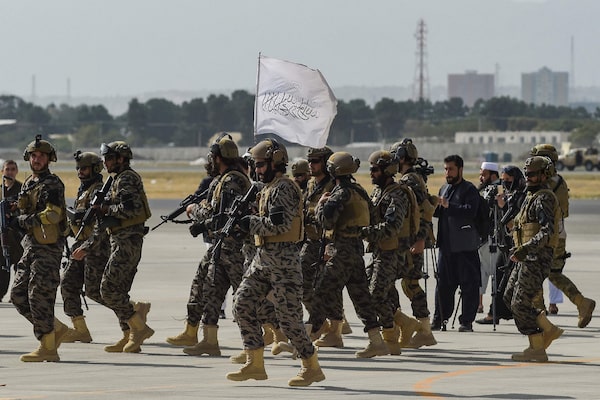
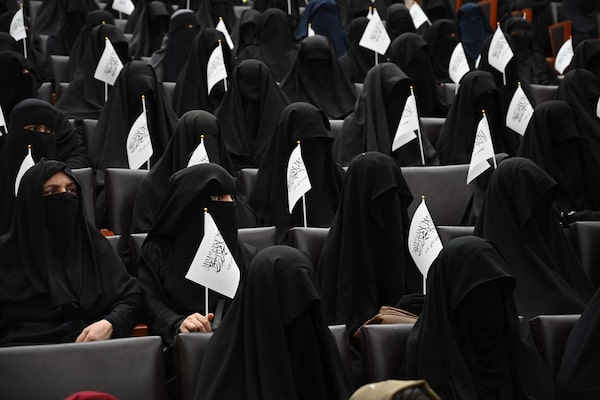
Flags of the conquerors: At top, Taliban fighters arrive at the Kabul airport on Aug. 31 after the U.S. military pulled the last of its troops out of the country; at bottom, veiled university students hold Taliban flags before a pro-Taliban rally on Sept. 11.WAKIL KOHSAR and AAMIR QURESHI/AFP via Getty Images
My filmmaker friend hasn’t seen the message I sent her on WhatsApp. The Hollywood Reporter, however, reports that she has told them in an interview that if she survives this, she will make a film about what happened.
Only two weeks earlier, in early August, she and I had talked on the phone for about an hour while I was making vegetable rice noodles in my kitchen in Toronto’s west end. She is in her newly bought condo in the west of Kabul. We discuss the screenplay she is writing, then we joke about some of the popular terminologies that entered Afghanistan with the American dollar in 2001: “proposal writing,” “capacity building,” “practicing democracy.” All of that feels very distant and means nothing. Those built capacities will soon be stranded behind the airport gates, the practice of democracy will come to a grinding halt, and the proposals were terribly written anyway.
While we talk, wildfires rage across the world and the heat in the kitchen is unbearable. I de-seed and mince three red chilies and add them to the pot. I sprinkle the broth with sumac, black pepper and salt, and as it simmers on low heat, I tell her that at the rate the governors are handing over provincial capitals, it won’t be long before the Taliban capture the capital. I don’t quite believe in my own statement. I’m an optimist. But I tell her maybe she should consider coming to Toronto while there are still commercial flights out of Kabul.
She says she will stay until next spring to see how things progress.
The progress is unexpectedly fast. Provinces fall like autumn leaves. National Army soldiers and police die in numbers. The elite Afghan Commandos, often with empty stomachs and no aerial support, are ferried from one corner of the country to the next to stop the advances of the Taliban. Civilians get caught in the crossfire. Some die; those who survive join the ranks of their internally displaced brothers and sisters. Afghans with a roof over their heads – home and abroad – who are convinced of Pakistan’s meddling, take the war to the virtual battlefield. #SanctionPakistan hashtags fly like bullets.
A high-school classmate of mine, a former Afghan diplomat, posts on Facebook that Mr. Ghani, along with his national security adviser – a young man with a PhD in 3D design – and the president’s former chief of staff, a man who collected child-care benefits from the Swedish government while being an adviser to the president, are allegedly planning to flee the country with suitcases stuffed with cash.
He creates the hashtag #ArrestGhani, but it doesn’t get traction because the general consensus among Afghans is that the president and his inner circle are morally corrupt, but they are no cowards. Only weeks earlier the president had mocked King Amanullah Khan’s flight to Europe a century ago, and in that raspy, shrieking tone of his had said he would stay till the end: “Da mei kor deh, da mei gor deh,” this country is my home and my grave. Then Mr. Ghani flees. Taliban fighters enter the Presidential Palace and take down the Afghan national flag. It’s televised and feels as if we are getting naked in front of the world, and we are ashamed of what the world sees.
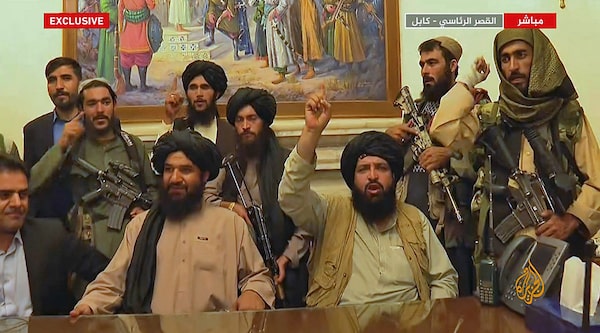
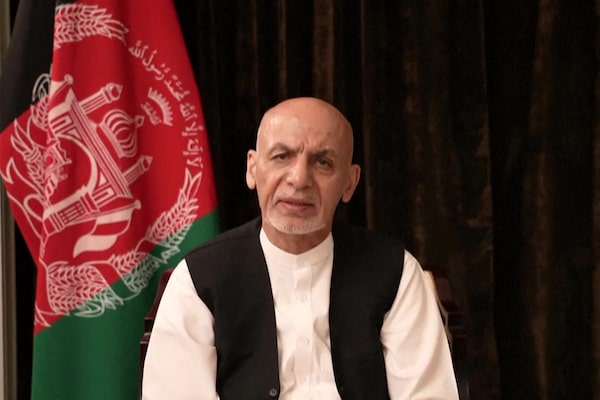
At top, Taliban celebrate in the Afghan president's office on Aug. 16; two days later, its former occupant, Ashraf Ghani, speaks on his Facebook page.AL JAZEERA and Facebook/AFP via Getty Images
The embarrassment deepens when Mr. Ghani puts out a statement on Facebook defending his cowardice. He says that he left so that Kabul doesn’t turn into a bloodbath. (By that logic he should have left a long time ago, for Kabul has been a bloodbath since he took office in 2014.) Two days later, in a video, he shifts the blame onto his security team – President Protective Service (PPS). A president who never took advice from anyone, and became known as the Little Dictator among Afghan intelligentsia, now claims he was advised by PPS to leave because there were armed men who spoke none of the country’s national languages and were going from room to room in the palace looking for the president. He denies the allegations that he stole cash. He says he didn’t even have time to change his sandals for his shoes. A deputy from the ministry of foreign affairs accuses Mr. Ghani of lying. He says that the president knew about his flight days in advance, and had asked the ministry for his passport. Then out comes a list naming 53 of the president’s aides and staff who boarded that flight alongside him. In an administration bogged down by corruption and poor communication as his, such an exodus would take days to co-ordinate.
But the dictator is out, the curtain has come down, and the officials can spill the secrets. In an interview with the BBC Persian, Mr. Ghani’s last chief of staff says that the president was suffering from chronic paranoia, that he viewed his top generals and spy chiefs with suspicion, fearing they would bring him down in a military coup. So the war leadership changed so frequently that the soldiers on the battlefield could no longer keep track of the chain of command. A woman who served as the deputy to the defence minister concurs and tells Afghanistan International television that Mr. Ghani only trusted the two young guys close to him. One of them – the man who collected child benefits from the government of Sweden – was put in charge of everything civilian. The other – the one with the PhD in 3D design – controlled everything military and was dreaming of running for president once his boss’s term was over. So he installed people in key security posts across the country, and influenced the president’s appointments for the cabinet seats. Merit and experience weren’t a requirement, the deputy suggests; loyalty and ethnic allegiance were. She and her boss were mere symbols with almost no authority.
They were the lucky ones to have been given a government position, however symbolic. Some political opponents found themselves swatting flies at home, or appearing on talk shows no one watched. Others were introduced to the high court for charges of mutiny, fraud, and, in one particular case, sodomy. Mr. Ghani and his inner circle pooled their skills and worked hard to make all that happen. When he first took office, his spokesman – besides boasting that Mr. Ghani co-authored a book in which he had fixed failed states – took pride in saying that the president worked 16 hours each day and took no breaks. Less than two weeks after the American troops pulled out, those long days finally caught up with the president, and not even the theories in his book could save him. He needed somewhere to rest, a place with palm trees, plush pillows and those mattresses that guarantee deep sleep.
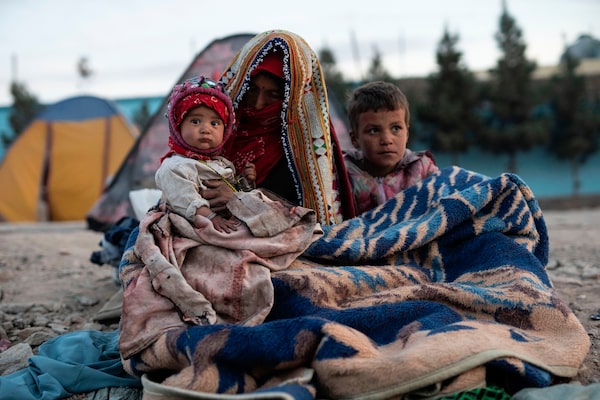
At the Directorate of Disaster camp in Herat, an Afghan family wrap themselves in blankets.Petros Giannakouris/The Associated Press
My filmmaker friend arrives in Paris, but she can’t sleep. She says that she has left behind her heart in Kabul.
My actor friend disagrees and believes there’s nothing left in Kabul, or in the country for that matter, where he remains. The French couldn’t evacuate him. His hope withers, and in its empty place, fresh frustration blooms. He goes back to smoking and posting on Facebook. He demands that God send down an asteroid big enough to wipeout the motherland that is Afghanistan. That’s one hell of a wish, I say to myself.
As “the world drift away into its madness,” I seek refuge in reading Charles Bowden and rising early. There is this belief among the old generation that if you are up and outside when day breaks you will live long. Length of life, like knowing the exact day I was born, doesn’t interest me – I know I should have been dead that warm evening during the civil war in 1993 when soldiers shot at us from the top of the hill while we played football down below, among the houses – yet I believe in this claim. I know people who have been early risers their entire life and are now so old that they have have lost their way to death. I like to avoid such a fate if I can. I rise early, however, because the plants I keep rely as much on being touched as they do on light and water. I hear the yearning of the dragon tree, the devil’s ivy and the rubber plant. Their lust wakes me. I caress them gently in the dark before I make coffee in the kitchen and go sit out on the balcony to look at the trees, trees that stand still in the backyard with their memories of the past and understanding of the future, trees that I trust have read Borges; they don’t speak, not even a rustle, because they know they can’t improve the silence.
And I like that and I like this hour of day. The squirrels are asleep. The cicadas are quiet. I sit with black coffee in hand and think of Afghanistan, of its hardworking handsome men, its intelligent ambitious women, its welcoming teashops and food stands, its poetry-reading circles, its sunny days and clear nights, and its proud young mountains alive with roars of untamed snow leopards. It comforts me to know that, before Alexander the Great, the Mongols, and all the invaders who have since arrived and departed, these mountains, lush valleys, cool streams, and vast plains have been here, and will be here until the yellow dwarf dims. It also comforts me to think that time never forgets its habits; that, cut it enough slack, God will mature and leave us alone; that, blink, and the Taliban will be gone again. I trust that. And I trust that the earth will tremble and tremble, as my mother likes to say, and it will come to rest. Until then I know I have to hold onto that key of patience.
Afghanistan: More from The Globe and Mail
The Decibel
On The Globe and Mail’s news podcast, retired Corporal Robin Rickards explains how he helped one of his old Afghan interpreters, Abdul Jamy Kohistany, to settle in Thunder Bay, Ont., with his family, and why veterans are still working to bring others to Canada. Subscribe for more episodes.
More coverage
Inside Taliban-held Afghanistan: ‘There is no food, no help, nothing here’
Afghan refugees, fearing Canada has abandoned them, dig in for a hard winter in overseas purgatory
Godmother of Afghan women’s rights stays to fight for the future